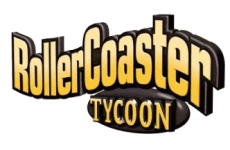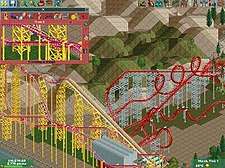RollerCoaster Tycoon
| RollerCoaster Tycoon | |
|---|---|
 Logo from the first game. Other games use a similar logo. | |
| Genres | Construction and management simulation |
| Developer(s) |
|
| Publisher(s) |
|
| Creator(s) | Chris Sawyer |
| Platforms | Microsoft Windows, Xbox, macOS, iOS |
| First release | RollerCoaster Tycoon |
| Latest release | RollerCoaster Tycoon World |
RollerCoaster Tycoon is a series of simulation video games about building and managing an amusement park. Each game in the series challenges players with open-ended amusement park management and development, and allowing players to construct and customize their own unique roller coasters and other thrill rides.
The first game was created by Scottish programmer Chris Sawyer, with assistance from various leading figures from the real-world roller coaster and theme park industry.[1] The rest of the series contains three other main games, expansion packs, a number of ports, and a mobile installment. The most recent installment, RollerCoaster Tycoon World, was released in November 2016.
Main series
RollerCoaster Tycoon
RollerCoaster Tycoon was released for Microsoft Windows on 31 March 1999 and was later ported to the Xbox game console. The game was developed by Chris Sawyer and published by Hasbro Interactive.
RollerCoaster Tycoon received two expansion packs: Added Attractions (released in the U.S. as Corkscrew Follies) in 1999, and Loopy Landscapes in 2000. Two special editions were released: RollerCoaster Tycoon Gold/Totally RollerCoaster in 2002, which contained the original game, Corkscrew Follies, and Loopy Landscapes; and RollerCoaster Tycoon Deluxe in 2003, which contained the content in Gold plus more designs for the different customizable rides. The game was released on Xbox on 23 March 2003.
RollerCoaster Tycoon 2
RollerCoaster Tycoon 2 was released on 15 October 2002. The game was developed by Chris Sawyer and published by Infogrames.
RollerCoaster Tycoon 2 has two official expansion packs: Wacky Worlds and Time Twister, both released in 2003. The Combo Park Pack edition contains the original game and the Wacky Worlds expansion. The Triple Thrill Pack contains the original game and both expansions.
RollerCoaster Tycoon 3
RollerCoaster Tycoon 3 was released on 26 October 2004 in North America. Although the core features of RollerCoaster Tycoon 3 are based on the previous games, Chris Sawyer, the developer of the first two games, acted only as a consultant. The game was developed by Frontier Developments instead, and published and advertised by Atari featuring a completely different structure.
Two expansion packs for RollerCoaster Tycoon 3 were released - Soaked! and Wild!. A bundle, RollerCoaster Tycoon 3 Gold, was also released, including the original game and the Soaked! expansion pack; this was followed by RollerCoaster Tycoon 3 Platinum (Deluxe for the EU version of the game), including both expansion packs and the original game. RollerCoaster Tycoon 3 Platinum was released for Windows and Mac OS X.
RollerCoaster Tycoon World
RollerCoaster Tycoon World was developed by Nvizzio Creations for Atari and released on 16 November 2016. The installment is different from previous games in that players build coasters with a spline-based system. It also introduced a new "Architect mode" and "safety-rating" options when building coasters. The game is also the first to incorporate the Steam Workshop.
Spinoffs
RollerCoaster Tycoon 3D
RollerCoaster Tycoon 3D was released on 16 October 2012. It was developed by n-Space for the Nintendo 3DS. While using many assets and engine content from Rollercoaster Tycoon 3, this game reverted to an isometric view and removed features such as adding scenery and pools due to the limitations of the Nintendo 3DS.
RollerCoaster Tycoon 4 Mobile
RollerCoaster Tycoon 4 Mobile was released on 10 April 2014. The game was initially available for iPhone, iPad and iPod touch devices. The game was later released for Android devices (OS 4.0.3 and higher) on 18 October 2014. The game was developed by On5 Games without Chris Sawyer's input (other than licensing).[2][3] The game returns to the isometric view used in the first two games. The game is built on the freemium model with social media integration.
This installment was universally panned and was criticized due to Chris Sawyer's absence in the making of the game, the heavy use of microtransactions and wait times, which fans state "has ruined the [RollerCoaster Tycoon] experience."[4][5]
RollerCoaster Tycoon 3: Mobile
Released in August 2015, RollerCoaster Tycoon 3: Mobile is an iOS version of RollerCoaster Tycoon 3, released by Frontier and is almost an exact clone of the original game (tutorial mode, original 18 scenarios for career, and a sandbox).
RollerCoaster Tycoon Classic
On 22 December 2016 a modified port of both RollerCoaster Tycoon and RollerCoaster Tycoon 2 was released for iOS and Android, featuring a single price point for the majority of content and in-app purchase for Expansion Pack content (primarily the two expansion packs from RollerCoaster Tycoon 2, and an editor pack that allows users to create custom scenario and import and export these to the Windows version of Roller Coaster Tycoon 2, and replicating the majority of the gameplay from the original games in the series.[6][7]
RollerCoaster Tycoon Touch
First released for iOS devices in December 2016, RollerCoaster Tycoon Touch is a free-to-play mobile port of RollerCoaster Tycoon World. Like RollerCoaster Tycoon 4, it contains in-app purchases and wait times, but expands upon the social media integration. An Android version was released in April 2017. [8] In October 2017, items based off the Barbie doll brand were added to the game.[9]
Future
In January 2018, Atari Game Partners announced it was seeking equity crowdfunding via the StartEngine platform in order to develop a new RollerCoaster Tycoon game for the Nintendo Switch.[10] In July 2018, Atari announced that the game will be titled RollerCoaster Tycoon Adventures and is scheduled for release in Autumn 2018.
A game designed for use with the PlayStation VR platform was announced and released in 2018 titles RollerCoaster Tycoon Joyride, but it was pulled from online stores shortly after release.
Gameplay

The player is given control over an amusement park and is tasked with reaching particular goals, such as improving the park's value, attracting more guests, or getting a higher park rating. Some scenarios in the game provide an empty plot of land and allow the player to build a park from scratch, while others provide a ready-built park which usually suffers from deterioration, bad planning, or underdevelopment. The player must wisely invest the limited amount of money provided.
Most scenarios require that the goals be achieved for a specific in-game date, otherwise the scenario is not 'complete'. Completion of scenarios is a prerequisite for unlocking further scenarios in the first RollerCoaster Tycoon game. In RollerCoaster Tycoon 2, all the scenarios are available for play and the player can complete them in random order.
The player is responsible for building out the park such as raising or lowering terrain, laying out footpaths, adding decorative elements, installing food, restroom, and trash facilities, and building out the rides and attractions. Many of the rides that can be built are roller coasters or variations on that, such as log flumes, water slides and go-kart tracks. The player can build these out with hills, drops, curves, and other features (such as loop-the-loops for steel roller coasters), limited only by cost and the geography of the park and other nearby attractions. Stationary rides, such as Ferris wheels, merry-go-rounds, and bumper cars can also be placed. Rides are ranked on scales of excitement, intensity, and nausea, all which influence which park guests will ride those attractions and how they will behave afterward. The player can set the prices for park admission rides and guest amenities. The player is also responsible for hiring park staff to maintain the rides, keep the park clean, and entertain the guests. Players may also invest in 'research', which unlocks new rides and improvements as time goes on, though it costs money to continue research. Research in a particular area is disabled when all attractions in that category are researched.
The guests, who are integral to the gameplay, are treated as separate entities which can each have particular characteristics and be tracked by the player around the park. The game keeps track of how much money they have, what they are carrying, their thoughts, and what their current needs are (thirst, hunger, etc.). Each guest also has some unique features such as preferring gentle rides over roller coasters, and their nausea tolerance. Some scenarios are even biased towards a specific guest demographic and require the player to take this into account in designing the park. In RollerCoaster Tycoon 3, the player can create their own guest groups to visit their parks.
Sequels have continually upgraded the number of rides and amount of customization available to the player.
Other media
The franchise has also spawned a board game and a pinball machine by Stern, both released in 2002,[11][12] and a series of gamebooks released in 2002 and 2003.[13]
In May 2010, it was reported that Sony Pictures Animation was to develop a film adaptation of the series.[11][14]
References
- ↑ "Chris Sawyer Software Development". www.chrissawyergames.com. Retrieved 2017-06-29.
- ↑ Faraday, Owen (19 March 2014). "Chris Sawyer: "No involvement" in RollerCoaster Tycoon 4". Pocket Tactics. Retrieved 15 April 2014.
- ↑ Yin-Poole, Wesley (3 March 2016). "A big interview with Chris Sawyer, the creator of RollerCoaster Tycoon". Eurogamer. dx.net. Retrieved 2 July 2016.
The world of games moved on and I didn't.
- ↑ "Micro-Transactions Make RollerCoaster Tycoon Fans Angry". IMDb.
- ↑ "RollerCoaster Tycoon 4 Mobile sparks fan outrage". MyGaming. 18 March 2014. Retrieved 2 February 2018.
- ↑ Davenport,Corbin (21 December 2016). "Atari brings RCT2 inspired Roller Coaster Tycoon class to Android for $5.99". Android Police. Retrieved 22 December 2016.
- ↑ Souppouris, Aaron (22 December 2016). "Classic 'RollerCoaster Tycoon' comes to iOS and Android". Engadget. Retrieved 22 December 2016.
- ↑ Souppouris, Aaron (22 December 2016). "rollercoaster tycoon touch announced". Engadget. Retrieved 22 December 2016.
- ↑ Cowley, Ric (19 October 2017). "Atari partners with Mattel to bring Barbie-branded content to RollerCoaster Tycoon Touch". pocketgamer.biz. Retrieved 2 January 2018.
- ↑ McAloon, Alissa (23 January 2018). "Atari looks to equity crowdfunding for RollerCoaster Tycoon Switch release". Gamasutra. Retrieved 23 January 2018.
- 1 2 "Roller Coaster Tycoon". BoardGameGeek. Retrieved 18 April 2014.
- ↑ "RollerCoaster Tycoon". The Internet Pinball Database. Retrieved 18 April 2014.
- ↑ "RollerCoaster Tycoon". Demian's Gamebook Web Page. Retrieved 18 April 2014.
- ↑ Kit, Borys (13 May 2010). ""Rollercoaster Tycoon" riding to the screen". Reuters. Retrieved 26 October 2010.